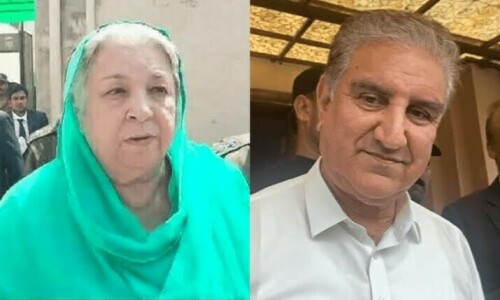Gen Sharif’s stance on terrorists pleases US


WASHINGTON: Gen Raheel Sharif is an extremely articulate spokesperson for Pakistan’s interests, says Dan Feldman, US Special Representative for Afghanistan and Pakistan.
In an interview to Dawn, Ambassador Feldman also said that US forces staying in Afghanistan after 2014 would only fight the Taliban only if they directly threatened them, supported Al Qaeda or posed a strategic threat to the Afghan National Security Forces.
He also dispelled the impression that the FBI action against Ambassador Robin Raphel was meant to send the message that it was no longer kosher for Americans to be friends with Pakistan.
“Gen Sharif is an extremely articulate spokesperson for Pakistan’s interests,” said Ambassador Feldman while talking about the Pakistan army chief’s much-talked about visit to the United States last week.
“In Washington, he received very broad support for Pakistan’s counter-terrorism campaign,” he said.
During his visit, Gen Sharif met a wide range of US officials — in both military and civil establishments — as part of an effort to rebuild a long-term relationship between the two militaries.
“We had very straightforward, constructive and honest discussions on the need to go after all terrorists, including the Haqqani network, and to make sure that all terrorist safe havens are shut down,” said Ambassador Feldman when asked if the visit achieved its goals.
“Yes, we all recognise that significant progress has been made” in the fight against terrorists since the North Waziristan operation, he said.
“We also recognise that more work needs to be done, but there’s true commitment from Gen Sharif to deliver on this,” said the US envoy.
“People in Washington were very pleased with his commitment” to fighting all terrorists, including the Haqqani network, he said.
Ambassador Feldman noted that the effort to rebuild a long-term relationship between the two militaries had began several years ago. “The visit continues that process and helps strengthen the relationship,” he said.
“This was one of the very significant visits.”
Commenting on recent media reports that President Barack Obama has now allowed US troops in Afghanistan to combat the Taliban, Ambassador Feldman noted that the president had stated in May that the United States would end its combat role in Afghanistan by Dec. 31, 2014. It will only maintain a counter-terrorism capability and a capability to train, advise, and assist the Afghan National Security Forces.
He explained that since then, the president’s national security team had been defining the operational and legal details required to continue executing those missions in 2015 within the scope of the Bilateral Security Agreement the US and Afghan governments signed in September.
These recommendations were recently passed to the president, who approved them.
“To the extent that Taliban members directly threaten the United States and coalition forces in Afghanistan, provide direct support to Al Qaeda, or pose a strategic threat to the ANSF, we will take appropriate measures to keep Americans safe and assist the Afghans,” Mr Feldman said.
The US media, however, has rejected this explanation.
One media report pointed that last May President Obama promised that 2014 would be “the year we conclude our combat mission in Afghanistan.” And giving even limited combat role to troops after 2014 was reversal of this promise, the report added.
But Ambassador Feldman said that the media was “exaggerating” this point, as there had been “no dramatic change” in the US combat policies in Afghanistan.
Responding to another question, the US envoy said he believed the induction of a new government in Afghanistan had brought “real” positive changes in relations between the two neighbouring countries.
“This improvement in Pakistan-Afghanistan relationship seems to me like a legitimate effort. We hope it is real. It appears to be real,” he said.
Asked about an FBI investigation against former Assistant Secretary of State Robin Raphel, who was considered one of Pakistan’s most trusted friends in Washington, Mr Feldman said since it concerned the Department of Justice, he would not like to comment on this matter.
But he disagreed with the suggestion that the FBI action was a message for Pakistan’s friends in Washington to stop supporting that country.
“Pakistan has many friends in Washington. Many, many, many people are committed and dedicated to making sure that this relationship continues,” said Mr Feldman.
He said that he also has been working for the last five years to improve US-Pakistan relations and was happy that the relations were improving now.
Published in Dawn, November 28th, 2014











































